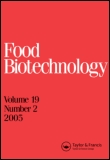
FOOD BIOTECHNOLOGY
metrics 2024
Advancing the Future of Food Science and Biotechnology
Introduction
FOOD BIOTECHNOLOGY is an essential journal for those engaged in the rapidly evolving fields of food science, biotechnology, and applied microbiology. Published by Taylor & Francis Inc., this journal has been a prominent platform since its inception in 1987, with a convergence of insights expected to continue until 2024. With an ISSN of 0890-5436 and an E-ISSN of 1532-4249, it holds significant academic weight, reflected in its 2023 rankings which place it in the Q3 category for both Applied Microbiology and Biotechnology and Biotechnology, alongside a stronger Q2 classification in Food Science. Although it currently does not operate as an open-access journal, its contributions to food biotechnology are invaluable for researchers, professionals, and students alike, providing a rigorous peer-reviewed outlet for innovative studies that advance the understanding of food processing, safety, and biotechnological applications. The journal’s relevance is further underscored by its Scopus rankings, which position it within the top tiers of its respective categories, making it a critical resource for the scientific community aiming to pioneer advancements in food biotechnology.
Metrics 2024
 0.38
0.38 1.80
1.80 2.00
2.00 40
40Metrics History
Rank 2024
Scopus
IF (Web Of Science)
JCI (Web Of Science)
Quartile History
Similar Journals

Applied Food Research
Exploring the Frontiers of Food Safety and NutritionApplied Food Research, published by Elsevier, is an esteemed journal that plays a critical role in advancing the field of Food Science. With an ISSN of 2772-5022, the journal has established itself as a premier outlet for high-quality research, achieving a commendable Q1 ranking in the 2023 Food Science category and a 63rd percentile in Scopus rankings for Agricultural and Biological Sciences. Covering a diverse range of topics from food safety to innovative processing techniques, Applied Food Research seeks to publish pioneering studies that enhance our understanding of food systems and contribute to broader discussions on sustainability and nutrition. As it converges on its fourth year of publication, researchers, professionals, and students alike are encouraged to engage with its content through various open access options, ensuring widespread dissemination of knowledge in a field that is vital to global health and well-being. Operating out of Amsterdam, Netherlands, this journal is poised to be an indispensable resource for anyone dedicated to making significant contributions in the domain of food science.
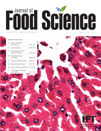
JOURNAL OF FOOD SCIENCE
Championing the Quest for Food Integrity and SafetyJOURNAL OF FOOD SCIENCE, published by Wiley, is a premier journal dedicated to advancing the field of food science, bridging the gap between fundamental research and practical application. With an impressive impact factor reflecting its authoritative status, the journal is ranked in the Q1 quartile for Food Science in 2023 and boasts a Scopus ranking of #71 out of 389, placing it in the 81st percentile within Agricultural and Biological Sciences. First launched in 1936, the journal continues to serve as an essential platform for researchers, professionals, and students to disseminate innovative studies and reviews that address critical issues in food quality, safety, and technology. While not currently offering open access, its rigorous peer-review process ensures the dissemination of high-quality and impactful research. Researchers engaged in the vital disciplines of food science will find this journal indispensable for keeping abreast of cutting-edge developments in the field.
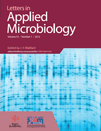
LETTERS IN APPLIED MICROBIOLOGY
Connecting Experts Through Groundbreaking Microbial StudiesLETTERS IN APPLIED MICROBIOLOGY, published by OXFORD UNIVERSITY PRESS, is a prominent journal in the field of applied microbiology, serving as an essential platform for researchers and professionals to disseminate innovative findings. With an ISSN of 0266-8254 and an E-ISSN of 1472-765X, this peer-reviewed journal has been contributing to the scientific community since 1985 and continues to engage with cutting-edge research through 2024. With its current Scopus ranking placing it in the 45th percentile of its category, specifically at rank #70 out of 127 in the Applied Microbiology and Biotechnology field, it underscores its significance in advancing knowledge and applications pertinent to microbial science. Although it is not open access, LETTERS IN APPLIED MICROBIOLOGY offers comprehensive insights aimed at enhancing the understanding of microbiological phenomena in practical scenarios, making it a valuable resource for both seasoned experts and emerging scholars.

Biotecnia
Connecting global minds in biotechnology excellence.Biotecnia is a premier journal published by UNIV SONORA, dedicated to advancing the field of biotechnology through the dissemination of high-quality research and innovative findings. With its ISSN 1665-1456, this journal provides a vital platform for researchers, professionals, and students to share scholarly work that encompasses a diverse range of topics, including molecular biology, genetic engineering, and bioprocessing. Despite being based in Hermosillo, Mexico, Biotecnia’s reach extends globally, aiming to foster collaboration and knowledge exchange among the international scientific community. The absence of an open-access option enhances the journal's exclusivity while ensuring rigorous peer review, thus maintaining high academic standards. As biotechnology continues to play a pivotal role in resolving global challenges, Biotecnia stands as an essential resource for those committed to innovation and research excellence in this evolving discipline.
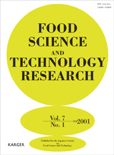
FOOD SCIENCE AND TECHNOLOGY RESEARCH
Advancing Food Innovation and SafetyFOOD SCIENCE AND TECHNOLOGY RESEARCH, published by the Japanese Society of Food Science & Technology, is a pivotal journal that encompasses a wide spectrum of research in the fields of food science, biotechnology, and engineering. With its ISSN number 1344-6606 and a digital counterpart E-ISSN 1881-3984, this journal aims to disseminate cutting-edge research and innovative technologies that enhance food safety, quality, and sustainability. Recognized for its contributions, it holds a Q3 category ranking in multiple disciplines, including Food Science and Biotechnology, indicating a significant role in advancing academic discourse. Researchers and professionals can benefit from its insights, as the journal covers an array of topics relevant to industrial applications, marketing strategies, and scientific advancements. Although not an open-access journal, it has a wide reach and is committed to providing high-quality, peer-reviewed content essential for scholars and practitioners in the food science community from 1999 to 2024.
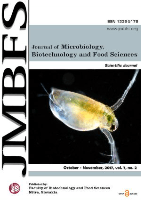
Journal of Microbiology Biotechnology and Food Sciences
Connecting research and application in microbiology and food safety.Journal of Microbiology Biotechnology and Food Sciences, published by SLOVAK UNIV AGRICULTURE NITRA, is a distinguished open-access journal dedicated to advancing scholarship in the interrelated fields of microbiology, biotechnology, and food sciences. With an ISSN of 1338-5178, this journal has been accessible to researchers worldwide since 2011, providing a platform for innovative studies that contribute to the understanding of microbial processes, biotechnological advancements, and food science applications. As reflected in its 2023 category quartiles, the journal holds notable positions in Biotechnology (Q3) and Food Science (Q3), and while it ranks in the lower quartiles for Microbiology (Q4) and Molecular Biology (Q4), it is committed to enhancing its impact within these domains. The journal encourages the submission of high-quality research articles, reviews, and short communications that address critical issues in these fields, making it an essential resource for academics, industry professionals, and students alike. Emphasizing both foundational research and practical applications, the Journal of Microbiology Biotechnology and Food Sciences stands as a vital contributor to the scientific discourse, fostering innovation and collaboration among researchers aiming to solve pressing challenges in food safety, biotechnology development, and microbial studies.

Izvestiya Vuzov-Prikladnaya Khimiya i Biotekhnologiya
Catalyzing Collaboration in Scientific DiscoveryIzvestiya Vuzov-Prikladnaya Khimiya i Biotekhnologiya, published by Irkutsk National Research Technical University, is a prominent open-access journal dedicated to advancing the fields of applied chemistry and biotechnology. Since its inception in 2011, this journal has provided a platform for the dissemination of significant research findings, innovative techniques, and technological advancements that bridge the gap between theoretical frameworks and practical applications. The journal is indexed in various databases, ensuring that published works reach a global audience of researchers, professionals, and students eager to explore the latest developments in these critical disciplines. With its commitment to open-access publishing, Izvestiya Vuzov-Prikladnaya Khimiya i Biotekhnologiya plays a vital role in fostering collaboration and knowledge sharing within the scientific community, thus contributing to the advancement of both fields in a rapidly evolving technological landscape.

Foods
Uniting Disciplines for Comprehensive Food Insights.Foods is a premier open access journal published by MDPI, based in Switzerland, that has been at the forefront of disseminating high-quality research in the fields of food science, health professions, and plant science since its establishment in 2012. With an impressive convergence of interdisciplinary studies spanning various aspects of food, nutrition, and microbiology, the journal aims to provide a comprehensive platform for researchers and professionals to share innovative ideas and findings. Maintained as a Q1 journal in multiple categories for 2023, including Food Science and Health Professions, Foods has garnered significant recognition within the academic community, reflected in its strong Scopus rankings and percentiles across various disciplines. The journal not only promotes open access to enhance the visibility and accessibility of research but also encourages the exploration of sustainable food systems and health-related issues, thus contributing to essential discussions in today's society. For those looking to advance their understanding and expertise in food-related sciences, Foods serves as an enduring resource for groundbreaking studies and critical insights.
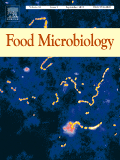
FOOD MICROBIOLOGY
Advancing food safety through microbial insights.FOOD MICROBIOLOGY is a premier journal, published by Academic Press Ltd - Elsevier Science Ltd, dedicated to advancing the field of food science and microbiology. With an impressive impact factor and recognition as a Q1 journal in Food Science and a Q2 journal in Microbiology, it holds a significant position in the scientific community, emphasizing research that explores microbial phenomena in food products. Established in 1984, the journal continues to thrive with converged coverage until 2025, making it an essential resource for researchers, professionals, and students aiming to deepen their understanding of food-related microbiological issues. While it operates under traditional access options, the journal is highly regarded for its rigorous peer-review process and impactful contributions to agricultural and biological sciences, ranking #26 in Food Science and #22 in Microbiology according to Scopus. Researchers are encouraged to submit their findings that impact food safety, quality, and preservation, fostering a collaborative environment that generates knowledge pivotal for the food industry and public health.

FOOD TECHNOLOGY AND BIOTECHNOLOGY
Empowering Researchers to Shape the Future of FoodFOOD TECHNOLOGY AND BIOTECHNOLOGY is a distinguished peer-reviewed journal published by the Faculty of Food Technology and Biotechnology, University of Zagreb, Croatia. Since its inception in 1993, this Open Access journal has become a crucial platform for disseminating innovative research in the fields of food science, biotechnology, and chemical engineering. With a commendable impact factor and consistent Q2 and Q3 rankings across multiple categories—including Biotechnology, Food Science, and Industrial Engineering—this journal not only fosters academic discussions but also addresses real-world challenges in food production, safety, and sustainability. As it converges its thematic scope from 1996 to 2024, FOOD TECHNOLOGY AND BIOTECHNOLOGY remains committed to advancing knowledge through high-quality research and interdisciplinary collaboration, making it an essential resource for researchers, professionals, and students seeking to stay at the forefront of food innovation and biotechnology.